Java Platform, Micro Edition or Java ME is a computing platform for development and deployment of portable code for embedded and mobile devices. Java ME was formerly known as Java 2 Platform, Micro Edition or J2ME. As of December 22, 2006, the Java ME source code is licensed under the GNU General Public License, and is released under the project name phoneME.
In computing, cross-platform software is computer software that is designed to work in several computing platforms. Some cross-platform software requires a separate build for each platform, but some can be directly run on any platform without special preparation, being written in an interpreted language or compiled to portable bytecode for which the interpreters or run-time packages are common or standard components of all supported platforms.
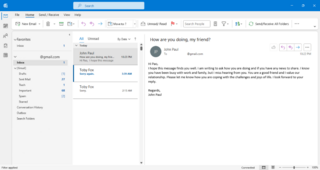
Microsoft Outlook is a personal information manager software system from Microsoft, available as a part of the Microsoft 365 software suites. Though primarily being popular as an email client for businesses, Outlook also includes functions such as calendaring, task managing, contact managing, note-taking, journal logging, web browsing, and RSS news aggregation.
A voice-user interface (VUI) enables spoken human interaction with computers, using speech recognition to understand spoken commands and answer questions, and typically text to speech to play a reply. A voice command device is a device controlled with a voice user interface.
Mobile app development is the act or process by which a mobile app is developed for one or more mobile devices, which can include personal digital assistants (PDA), enterprise digital assistants (EDA), or mobile phones. Such software applications are specifically designed to run on mobile devices, taking numerous hardware constraints into consideration. Common constraints include CPU architecture and speeds, available memory (RAM), limited data storage capacities, and considerable variation in displays and input methods. These applications can be pre-installed on phones during manufacturing or delivered as web applications, using server-side or client-side processing to provide an "application-like" experience within a web browser.
Mobile device management (MDM) is the administration of mobile devices, such as smartphones, tablet computers, and laptops. MDM is usually implemented with the use of a third-party product that has management features for particular vendors of mobile devices. Though closely related to Enterprise Mobility Management and Unified Endpoint Management, MDM differs slightly from both: unlike MDM, EMM includes mobile information management, BYOD, mobile application management and mobile content management, whereas UEM provides device management for endpoints like desktops, printers, IoT devices, and wearables as well.
A mobile operating system is an operating system for smartphones, tablets, smartwatches, smartglasses, or other non-laptop personal mobile computing devices. While computers such as typical/mobile laptops are "mobile", the operating systems used on them are generally not considered mobile ones, as they were originally designed for desktop computers that historically did not have or need specific mobile features. This line distinguishing mobile and other forms has become blurred in recent years, due to the fact that newer devices have become smaller and more mobile unlike hardware of the past. Key notabilities blurring this line are the introduction of tablet computers and light-weight laptops and the hybridization of the two in 2-in-1 PCs.
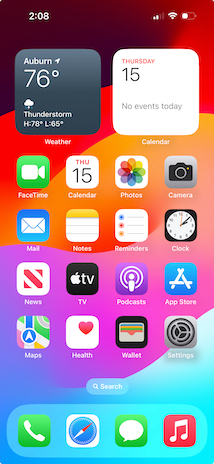
iOS is a mobile operating system developed by Apple Inc. exclusively for its hardware. It is the operating system that powers many of the company's mobile devices, including the iPhone; the term also includes the system software for iPads as well as on the iPod Touch devices. It is the world's second-most widely installed mobile operating system, after Android. It is the basis for three other operating systems made by Apple: iPadOS, tvOS, and watchOS. It is proprietary software, although some parts of it are open source under the Apple Public Source License and other licenses.
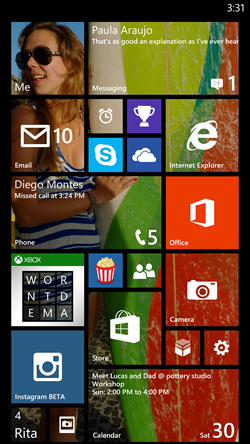
Windows Phone (WP) is a discontinued family of mobile operating systems developed by Microsoft for smartphones as the replacement successor to Windows Mobile and Zune. Windows Phone featured a new user interface derived from the Metro design language. Unlike Windows Mobile, it was primarily aimed at the consumer market rather than the enterprise market.

The HTC Dream is a smartphone developed by HTC. First released in September 2008, the Dream was the first commercially released device to use the Linux-based Android operating system, which was purchased and further developed by Google and the Open Handset Alliance to create an open competitor to other major smartphone platforms of the time, such as Symbian, BlackBerry OS, and iPhone OS. The operating system offers a customizable graphical user interface, integration with Google services such as Gmail, a notification system that shows a list of recent messages pushed from apps, and Android Market for downloading additional apps.
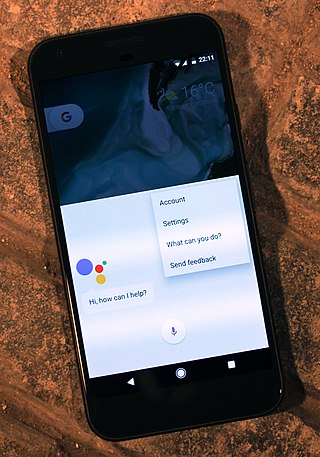
A virtual assistant (VA) is a software agent that can perform a range of tasks or services for a user based on user input such as commands or questions, including verbal ones. Such technologies often incorporate chatbot capabilities to simulate human conversation, such as via online chat, to facilitate interaction with their users. The interaction may be via text, graphical interface, or voice - as some virtual assistants are able to interpret human speech and respond via synthesized voices.

Siri is the digital assistant that is part of Apple Inc.'s iOS, iPadOS, watchOS, macOS, tvOS, audioOS, and visionOS operating systems. It uses voice queries, gesture based control, focus-tracking and a natural-language user interface to answer questions, make recommendations, and perform actions by delegating requests to a set of Internet services. With continued use, it adapts to users' individual language usages, searches, and preferences, returning individualized results.
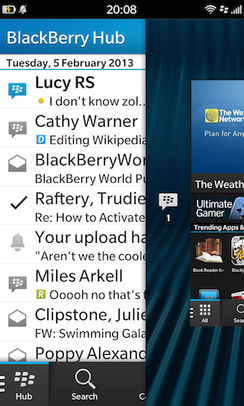
BlackBerry 10 (BB10) is a discontinued proprietary mobile operating system for the BlackBerry line of smartphones, both developed by BlackBerry Limited. Released in January 2013, BlackBerry 10 is a complete rework from the company's previous BlackBerry OS software.
A mobile application or app is a computer program or software application designed to run on a mobile device such as a phone, tablet, or watch. Mobile applications often stand in contrast to desktop applications which are designed to run on desktop computers, and web applications which run in mobile web browsers rather than directly on the mobile device.
Microsoft mobile services are a set of proprietary mobile services created specifically for mobile devices, they are typically offered through mobile applications and mobile browser for Windows Phone platforms, BREW, and Java. Microsoft's mobile services are typically connected with a Microsoft account and often come preinstalled on Microsoft's own mobile operating systems while they are offered via various means for other platforms. Microsoft started to develop for mobile computing platforms with the launch of Windows CE in 1996 and later added Microsoft's Pocket Office suite to their Handheld PC line of PDAs in April 2000. From December 2014 to June 2015, Microsoft made a number of corporate acquisitions, buying several of the top applications listed in Google Play and the App Store including Acompli, Sunrise Calendar, Datazen, Wunderlist, Echo Notification Lockscreen, and MileIQ.
Assistant is an intelligent personal assistant application for mobile devices developed by Speaktoit. Originally launched in October 2011 for the Android platform, Assistant had since come to iOS and Windows Phones. Assistant used natural language processing and speech recognition to interact with its users and was able to have clarifying conversations. Unlike Apple's Siri, Assistant came in the form of a customizable, cartoonish avatar.
Artificial Solutions is a multinational technology company that develops technology for conversational AI systems.

Cortana is a discontinued virtual assistant developed by Microsoft, that uses the Bing search engine to perform tasks such as setting reminders and answering questions for the user.
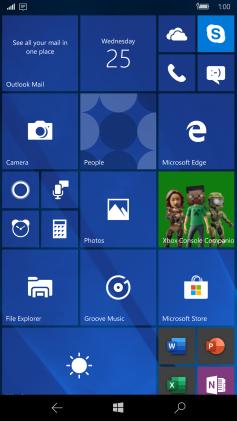
Windows 10 Mobile is a discontinued mobile operating system developed by Microsoft. First released in 2015, it is a successor to Windows Phone 8.1, but was marketed by Microsoft as being an edition of its PC operating system Windows 10.

Typewise is a Swiss deep tech company that builds text prediction AI. In January 2022, the company filed a patent for its technology which it claims outperforms that of Google's and Apple's.









